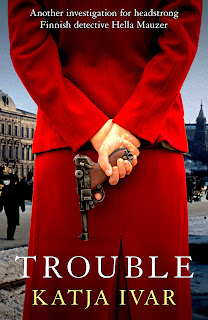Katja Ivar is the author of the new novel Trouble, the third in a series featuring her character Hella Mauzer. Ivar lives in Washington, D.C.
Q: This is your third Hella Mauzer mystery--what inspired the plot of Trouble?
A: There's that thing that (still) happens to women - sometimes people just think they can decide for you, and when you challenge them, they explain that they are acting like that "for your own good!" Because some people still think women are incapable of knowing what is good for them, what they want. I wanted to build a story around that.
It takes place in the 1950s, but Hella is the sort of character who would not accept being patronised. She will keep on investigating, even if many people tell her she better not - for her own good.
The story starts with Hella doing a routine background check - as run-of-the-mill as it can get - but that quickly morphs into something much more dangerous. Even Hella is left wondering if she's up for that much excitement.
Q: In our previous interview, you noted that this third book took place in summertime, in the polar daylight, as opposed to the previous two books. How important is that to the plot?
A: Very important, for two reasons. First of all, the crime Hella progressively uncovers is so dark, but hidden in plain sight - I wanted to create a stark contrast between the sunlit summer city and the secrets hidden within.
Also, my character, Hella, is at a crossroads in what concerns her personal life. She's not that young by 1950s standards. She's unmarried. She has just terminated an affair with a married man who was the love of her life.
I wanted the events in the novel to take place around Juhannus (Midsummer) night - the time that is traditionally associated with many superstitions around love and marriage - because it is in opposition with Hella's worldview. Society, and fate, is pushing her in one direction. Will she go there is the question.
Q: How did you research the novel, and did you learn anything that especially surprised you?
A: I do try to be as precise as possible, and so this time around, I spent quite a bit of time going through old city maps, trying to figure out what tram line Hella would take, what songs my characters would listen to, and what would be on the front pages of newspapers.
As Hella's best friend (and sometimes reluctant sidekick, Tom) is a pathologist, I also had much fun trying to figure out what medical discoveries had been made at the time - and one of these provides an important clue to the enigma, though my characters do not realise it at first.
Q: The writer Maxim Jakubowski, referring to the first Hella Mauzer novel, Evil Things, called Hella a "feminist 1952 cop before feminism was invented." What do you think of that description?
A: That's so true! Feminism as an attitude has always existed, even when there was no word to name it. Contrary to what everyone around her thinks, Hella is absolutely convinced she can be as good as any man - or even better. In this novel, the weight of society's expectations lies heavily on her shoulders - but she won't have any of that. Of course, trouble ensues.
Q: What are you working on now?
A: I am always scribbling something - storylines, descriptions, character studies. I have plotted another novel - now I just need to start writing it :-)
--Interview with Deborah Kalb. Here's a previous Q&A with Katja Ivar.


No comments:
Post a Comment